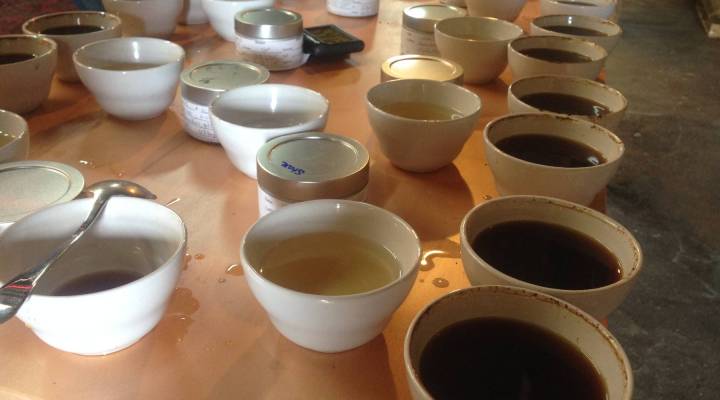
Coffee prices are down, but your latte’s still expensive. Here’s why.
Coffee prices are down, but your latte’s still expensive. Here’s why.

I get coffee pretty much every morning on the way to work. This morning ritual costs around $4.
The price of coffee is near record lows right now, less than half of what it cost two years ago. Two years ago when my latte cost… about $4.
This got me wondering. It seems like when a commodity like coffee or chocolate or bread gets more expensive, the price at the store goes up (like when Starbucks jacked prices up a couple years ago) but when commodities get cheaper, the retail price never seems to go down. It feels a little like Murphy’s law of economics.
“I’m not sure that it’s necessarily Murphy’s law,” counters Andrew Burns, economist at the World Bank. “In a country like the U.S., when you go to the store and you buy a loaf of bread, the cost of the wheat in that bread is relatively small.”
Burns says that’s because workers get paid a lot here (relatively), and rent is expensive. Burns says in countries where labor and rent are cheaper, the price of the commodity makes up a much bigger percentage of the price at the store.
“In developing countries, when commodity prices are fluctuating, it’s felt much more directly in the pocket book of individuals,” Burns says.
Here in the U.S., the coffee beans in a latte, for example, only account for about 10 percent of the price–40 cents of the $4–the rest of what I’m paying for is rent and labor.
Still, 10 percent of a company’s cost isn’t nothing, so shouldn’t I see at least a little savings?
Turns out, that depends on which kind of coffee we’re talking about
“This is Wall Street Dark Roast. One of our favorites.”
At his office in Midtown Manhattan, HiLine Coffee CEO Gene Kakaulin samples one of his roasts. HiLine makes single serve coffee pods and the beans he uses are high quality beans.
“The interesting thing about the coffee market is that the commodity coffee market and the specialty coffee market have a significant disparity in price,” says Kakaulin. “What you see on the exchange, the commodity price, is significantly lower than what we pay for coffee.”
The beans Kakaulin uses and the beans in my latte are specialty beans. The beans sold by the ton on commodities exchanges are used to make the coffee you might get at diner or at the grocery store. Prices have gone down a little there.
But it turns out, in the specialty coffee market, there is something of a Murphy’s law situation going on.
Matt Banbury is a roaster and manager for Joe Coffee—a chain of cafes.
“The level of quality that we’re buying… floats in its own sort of category. Though, if the commodity price rises too high and there’s a scarcity in commodity coffee, they will dip into specialty coffee. Which makes things more expensive.”
In other words, when commodity grade beans get cheaper, the price of specialty beans won’t necessarily drop, but when commodity beans get more expensive, all beans get more expensive…
And my latte gets more expensive.
Or maybe not. Cafes can’t crank up the cost of a latte every week, even if bean prices are rising. Consumers are very sensitive to price hikes.
Especially before they’ve had their coffee.
There’s a lot happening in the world. Through it all, Marketplace is here for you.
You rely on Marketplace to break down the world’s events and tell you how it affects you in a fact-based, approachable way. We rely on your financial support to keep making that possible.
Your donation today powers the independent journalism that you rely on. For just $5/month, you can help sustain Marketplace so we can keep reporting on the things that matter to you.


















